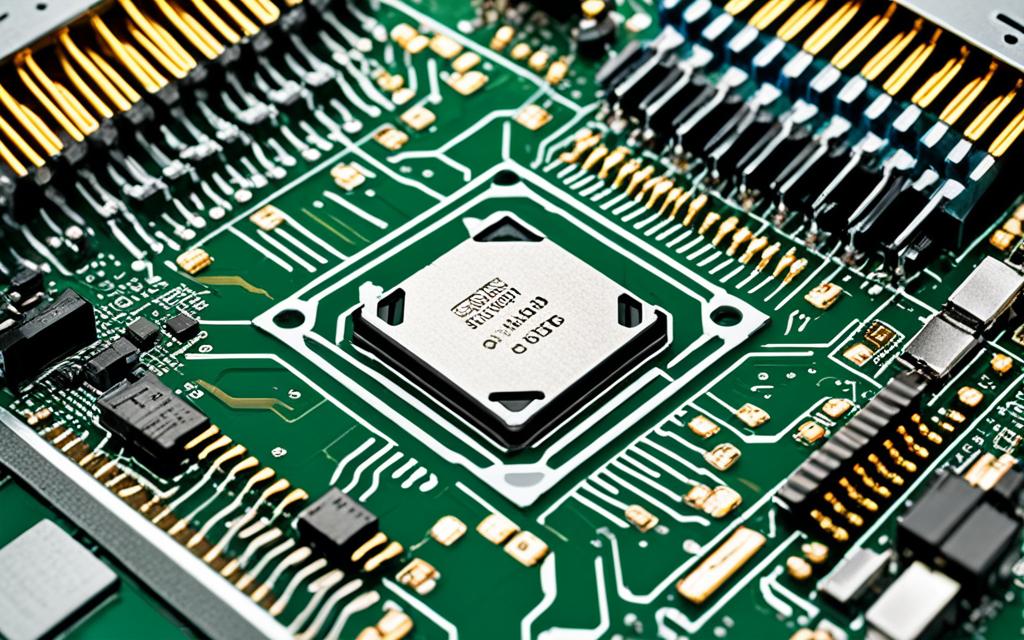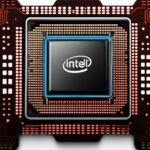Table of Contents
In the computing world, CPU sockets are key for linking the processor with the motherboard. These crucial parts help when building PCs or upgrading them. It’s vital to know the different CPU sockets made by AMD and Intel.
Each company creates unique CPU sockets. These affect which motherboards work with your system. Without this knowledge, you might choose the wrong parts. This could stop you from getting the system’s best performance.
With tech evolving, knowing the latest on CPU sockets is key. It’s not just about picking the right socket. You also need to understand how changes over time affect what you can do. The CPU socket world is complex, with AMD and Intel always introducing new stuff. Being up to date makes building or updating PCs much easier.
For more information on the foundational structures of computing networks, you can explore this informative resource.
Key Takeaways
- CPU sockets are essential for establishing connections between the processor and the motherboard.
- Understanding the different types of CPU sockets is crucial for ensuring motherboard compatibility.
- AMD and Intel utilize distinct socket types, impacting performance and upgrade options.
- Informed decisions are paramount when building or upgrading PCs.
- Staying updated with the latest CPU socket developments simplifies the construction process.
The Importance of CPU Sockets in Computing
Grasping the role of a CPU socket is key for those wanting to enhance their computing. It links the central processing unit with the motherboard. This bond allows smooth communication among components. By understanding CPU sockets, you make smarter choices about motherboards. This boosts your CPU’s performance.
What is a CPU Socket?
A CPU socket connects the CPU to your motherboard. Most motherboards have a single CPU socket. However, some powerful systems in big companies can use up to 8 CPUs at once2. You’ll find different types of sockets, like PGA for AMD processors, and LGA for Intel ones3. The type matters for easy installation and cost benefits. It’s vital for your computer’s build.
How CPU Sockets Impact Performance
CPU sockets play a big role in how well a computer works. For example, Intel’s LGA 1151 series is famous for desktops, while AMD’s AM4 fits well with their Ryzen line3. LGA sockets, used in gaming PCs, are great for electricity use and cooling3. But PGA sockets, though cheaper, can get damaged easily if not handled carefully2. The right socket choice can make your CPU run better and more smoothly.
| Socket Type | Used By | Advantages | Common Applications |
|---|---|---|---|
| PGA | AMD | Cost-effective, good heat dissipation | Home/office desktops, budget builds |
| LGA | Intel | Ease of installation, improved electrical performance | Desktop computers, gaming systems |
| BGA | Various | Durable, precise connections | Laptops and portable devices |
Knowing about different CPU sockets helps you make better choices. It ensures your motherboard works well with your CPU for improved performance3.
What Are Two Common Types of CPU Sockets?
Understanding different CPU sockets is key in the computer world. AMD and Intel use different sockets based on their unique designs. These affect how processors fit and work in a computer.
Each design supports different performance levels and compatibility. They impact how easily you can install or upgrade your computer’s processor.
AMD CPU Sockets Explained
AMD relies on the Pin Grid Array (PGA) design for its CPUs. Here, the processor has the pins. This makes them easier to install. The AM3 and AM4 sockets support many AMD processors, like Athlon and Ryzen.
For example, the AM4 socket fits AMD’s Ryzen 5000 CPUs. This allows upgraded compatibility with older Ryzen motherboard models1. PGA sockets are cheaper to make but need careful handling to avoid pin damage4.
Intel CPU Sockets Overview
Intel uses the Land Grid Array (LGA) design, where the motherboard contains the pins. This reduces the risk of bending or breaking pins when you fit the CPU4. Intel’s LGA 1151 and LGA 1200 are prominent socket types.
The LGA 1200 is designed for Rocket Lake CPUs. However, not all LGA 1200 motherboards work with these newer chips. Compatibility issues can occur with older models1
AMD and Intel socket types reflect their distinct design strategies. They influence CPU functionality and the user’s experience. Knowing the differences helps in choosing the right parts for a computer.
For more info on these sockets, check out this detailed guide here5.
Key Differences Between AMD and Intel Sockets
In the world of CPUs, the type of socket makes a big difference. It influences performance and compatibility. Whether you are building a new PC or upgrading, it’s crucial to know the differences between AMD and Intel sockets.
Pin Placement: AMD vs. Intel
When we talk about pin placement, AMD and Intel are quite different. AMD has stuck with its AM4 socket for more than five years. This makes it great for those starting out, as it works well with older motherboards6. On the other hand, Intel’s LGA 1700 fits the newest 12th generation CPUs. The pins are on the motherboard, not on the CPU itself6.
These differences change how you install the CPU. AMD uses a pin grid array (PGA) layout, making installation straightforward. Intel uses a land grid array (LGA) setup, which is a bit different.
Retention Mechanisms: How They Work
There’s more to these sockets than just pins. AMD uses a simple lever to lock the CPU in place. Intel, however, uses a more complex bracket and latch. This extra step makes sure the CPU is secure, even when you move your computer.
Generational Compatibility Issues
AMD is switching to an AM5 socket for its Ryzen 7000 series CPUs. This new socket shifts from PGA to an evolved LGA design6. You can still use your old motherboard if it fits the new socket. This makes upgrading easier, but it’s key to check compatibility7.
Intel’s socket approach has also changed over time. New features have been added with each generation. However, upgrading often means getting a new motherboard. This can make improving your PC more complex.
How to Choose the Right CPU Socket
Choosing the right CPU socket is essential for building a PC. It has to match the tasks you want your computer to do, like gaming or work. Think about if you can upgrade it in the future and how well it performs.
Factors to Consider When Building a PC
Several key factors need attention when you build a PC:
- Compatibility: It’s vital to match the CPU socket with your motherboard. The Intel LGA 1700 socket works with Alder Lake and Raptor Lake processors, supporting advanced features. On the other hand, the AMD AM5 socket is for Ryzen 7000 series processors and has 1718 pins, bigger than AM4.
- Performance: The type of socket can greatly affect your PC’s speed. Intel’s LGA sockets are sturdy since the pins are on the socket itself, lessening damage risks during setup89.
- Future-proofing: Choosing a socket that can support upgrades later on is smart. AMD’s AM4 socket is compatible with different CPUs and APUs, making it a solid choice for future upgrades9.
Using Compatibility Tools to Ensure Proper Fit
Compatibility tools are a must for PC builders. Tools like PC Part Picker check if your parts will work together. They provide a list of compatible items, reducing the chance of issues. Using these tools helps builders make informed choices and ensures their PC components fit well together for the best performance.
Conclusion
Knowing the CPU sockets overview is crucial for anyone building a PC, especially when it comes to performance. AMD’s PGA and Intel’s LGA socket types are widely used. Each has its own specifications to support different processors and boost system performance10.
As tech advances, understanding socket types becomes more important. This helps avoid compatibility issues with CPU generations or revisions10. AMD’s AM4 and TR4 sockets are for mainstream and high-end CPUs. Meanwhile, Intel mostly uses LGA sockets11. Picking the right socket is key for your computer’s performance and reliability11.
Using powerful multi-core processors for tough tasks requires knowledge of these elements12. It’s also important for choosing the right cooling solutions for the TDP. Knowing about CPU socket updates is vital for those seeking an efficient and long-lasting PC.
FAQ
What is the significance of CPU sockets in PC building?
CPU sockets are key because they decide if a CPU and a motherboard can work together. This decision influences how well the PC works. It also impacts upgrading possibilities.
What types of CPU sockets are there?
There are mainly AMD and Intel CPU sockets. AMD uses a pin grid array (PGA). Intel prefers a land grid array (LGA). Each has many types for different CPU generations.
How can I determine the right CPU socket for my motherboard?
To pick the right CPU socket, look at your motherboard’s manual for the right type. It must match your CPU. Tools like PC Part Picker help with this task.
What happens if I use an incompatible CPU with a socket?
If the CPU doesn’t match the socket, problems arise. The PC might not work right or at all. It’s due to the CPU not fitting in the wrong socket.
How do AMD and Intel sockets differ in terms of design?
AMD puts pins on the CPU (PGA). Intel has them on the motherboard (LGA). This leads to different ways of putting them together and keeping them secure.
Why is generational compatibility important?
New CPU generations usually need a new socket type. So, older motherboards might not work with newer CPUs. This is true even if they share a socket type.
What are some key factors to consider when selecting a CPU socket?
Consider what you’ll use the PC for, like gaming or work. Think about whether you prefer AMD or Intel. Make sure every part can work together by using tools like compatibility checkers.
Are there resources available to help check compatibility between CPUs and motherboards?
Yes. Tools like PC Part Picker offer detailed lists. They help make sure CPUs and motherboards match up well. This avoids any compatibility problems.
Source Links
- https://www.howtogeek.com/738818/what-is-a-cpu-socket-type-cpu-socket-types-explained/ – What Is a CPU Socket Type? CPU Socket Types Explained
- https://www.candtsolution.com/news_events-detail/what-is-a-cpu-socket/ – What Is A CPU Socket?-C&T Solution Inc. | 智愛科技股份有限公司
- https://ms.codes/blogs/computer-hardware/two-common-types-of-cpu-sockets – Two Common Types Of CPU Sockets
- https://www.linkedin.com/advice/0/what-pros-cons-using-different-types-cpu – What are the pros and cons of using different types of CPU sockets, such as LGA, PGA, or BGA?
- https://en.wikipedia.org/wiki/CPU_socket – CPU socket
- https://screenrant.com/intel-amd-motherboard-socket-types-explained/ – Intel & AMD Motherboard Socket Types Explained
- https://www.makeuseof.com/tag/cpu-socket-types-explained-from-socket-5-to-bga-makeuseof-explains/ – CPU Socket Types Explained: Socket 5 to BGA
- https://medium.com/@rahul660singh/choosing-the-right-socket-a-guide-to-cpu-compatibility-41d5a0231f0d – Choosing the Right Socket: A Guide to CPU Compatibility
- https://globalamericaninc.com/cpu-sockets-into-the-specifics/ – CPU Sockets – Into the Specifics – Global American
- https://medium.com/@dividedwewillfall/what-is-a-cpu-socket-80df43315598 – What Is A CPU Socket?
- https://softwareg.com.au/blogs/computer-hardware/what-is-the-cpu-socket – What Is The CPU Socket
- https://ms.codes/en-gb/blogs/computer-hardware/cpu-cores-and-sockets-explained – CPU Cores And Sockets Explained








